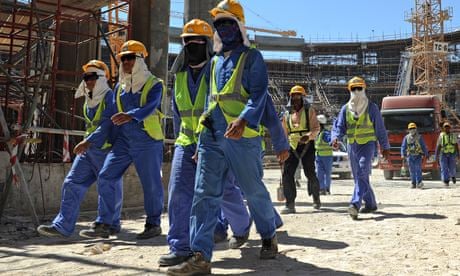A series of countries have piled pressure on Qatar to reform its labour laws to prevent mistreatment of migrant workers helping prepare for the 2022 World Cup.
Many of the 84 countries speaking at the UN Human Rights Council panel reviewing Qatar's human rights record called on the Gulf state to scrap its kafala sponsorship system that restricts each of its 1.4 million migrant workers to a single employer.
Several also linked Qatar's hosting of the 2022 World Cup directly with the need for labour reform. Recent reports from the UN and the International Labour Organisation also called on Qatar to reform labour laws and step up enforcement.
"There are widespread reports of violations of the rights of migrant workers, especially in the context of preparations for the 2022 Fifa World Cup," the Ireland delegation told the panel.
Recommendations, which are not binding, included scrapping exit visas which can prevent immigrant workers leaving, and giving legal protection against what Belgium said was "persistence of violence against women and girls".
The UK delegation called for a clear timetable on scrapping the sponsorship system and for the introduction of new rules to protect domestic workers, who are not covered by existing labour law.
The main countries that supply migrant workers to Qatar, and are therefore dependent on the jobs provided by the construction boom in the country, were less critical. However, Indonesia, one of the main providers of domestic workers, called for new laws to protect them.
Spain led calls to "strike from the books" the kafala sponsorship system which gives employers complete control over their workers.
The Netherlands called on Qatar to make adequate labour conditions "an important criterion for granting building contracts" and to blacklist contractors who violated rules. The US also called for the kafala system to be scrapped.
The Qatari authorities recently took possession of a report from law firm DLA Piper that was commissioned in the wake of the global outcry that followed a series of Guardian reports on the treatment of migrant workers, and pressure from human rights organisations.
The International Trade Union Confederation has warned that 4,000 workers could die before a ball is kicked in 2022 if nothing is done to protect their rights.
Amnesty International and Human Rights Watch have detailed a string of cases where workers are toiling for little pay in unsafe and insanitary conditions. Some have been prevented from leaving the country and others had their wages withheld.
Changes to the labour law, based on the recommendations in the DLA Piper report, are expected to be unveiled in the coming weeks.
Delegates at the UN meeting also called on Qatar to improve women's rights, guarantee freedom of expression in the country and release Mohammad al-Ajami, a poet sentenced to 15 years for criticising the ruling Emir.
Qatar's assistant foreign minister, Sheikh Mohammed bin Abdulrahman bin Jassim Al-Thani, said there had been "some helpful recommendations from different countries."
"We recognise that there are certain issues and challenges we are facing about the migrant workers," the minister told the Associated Press after the three-hour meeting. "We think the World Cup is a catalyst for us to help us accelerate our performance."
He added that the changes to the labour laws, which pressure groups hope will include a commitment to scrap the exit visa system, would be announced this month. "We will come, I think, very soon within the current month with an overall work programme."
The minister opened the panel meeting outlining progress made enacting recommendations, including measures to combat human trafficking and protecting women and children from domestic violence, since a previous four-yearly review in 2010.

Comments (…)
Sign in or create your Guardian account to join the discussion